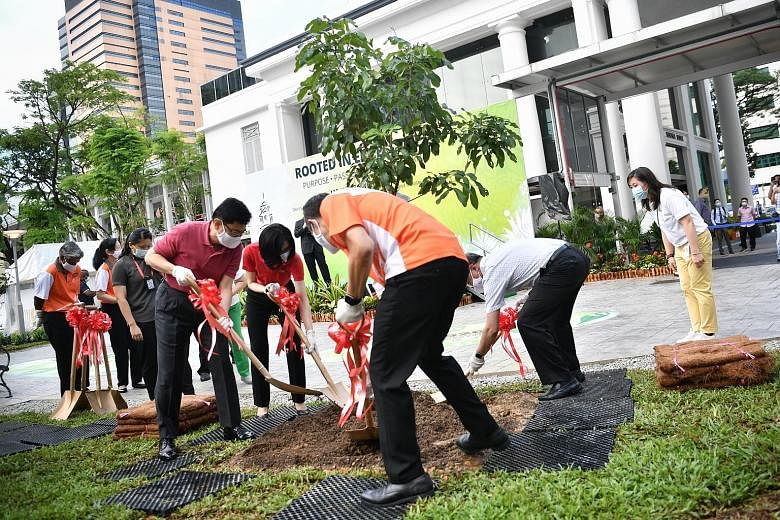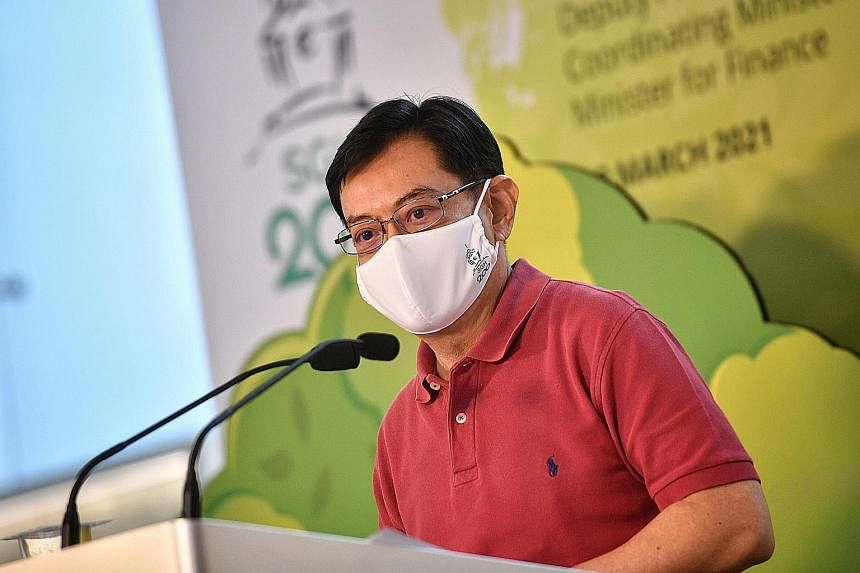In just 50 days, the Singapore General Hospital (SGH) turned a carpark into a fully fledged Covid-19 isolation ward - an achievement that testifies to how resilient and innovative the country's healthcare system has been over the past year, said Deputy Prime Minister Heng Swee Keat yesterday.
The pandemic has underscored the importance of building a resilient and robust system as Singapore presses ahead with efforts to transform healthcare, he added.
"We must continue to strengthen our systems and capabilities, and our front-line workers must remain nimble and adaptable in responding to this virus and future crises," Mr Heng said at SGH's 200th anniversary celebrations, which were streamed online.
In his speech, the minister commended staff for their dedication and commitment, saying: "I am glad that you also faced the uncertainties with courage, and adapted and innovated as the situation evolved."
But Singapore's healthcare transformation journey is not yet complete, Mr Heng said, listing three more areas of change.
First, the country is shifting its focus from providing healthcare to actively promoting a healthy lifestyle. The number of people with chronic ailments such as diabetes has grown, Mr Heng said, noting that these conditions can become complicated if not managed well, and may severely impact quality of life.
A second area of transformation is greater integration in healthcare, with each institution taking a "holistic and multi-disciplinary approach". Better collaboration among various institutions - from polyclinics to hospitals, as well as with the private sector and wider community - is also a must, Mr Heng said.
Lastly, Singapore continues to transform by pursuing healthcare innovation. "Much of the improvements to health outcomes and cost efficiency in past decades are due to our investments in science and technology," the minister said.
He also reiterated the Government's pledge that all Singaporeans will have access to "affordable, appropriate and quality healthcare" even as the population ages.
He called on Singaporeans to place a heavier emphasis on staying active and healthy, adding: "As a society, we must also take greater collective responsibility, whether it is through social risk pooling, such as MediShield Life and CareShield Life, or through the taxes that we each contribute, so that we can build a fairer and more equitable society for all."
Around 800 people tuned in to yesterday's online celebrations, where SGH chief executive Kenneth Kwek highlighted the hospital's defining values of purpose, passion, courage and grit. "Our people have grit; the tenacity to hang on and keep going, even when the going is tough... Each time, we pick up the pieces and learn to be better."
Mr Heng noted how in 1821, when the hospital was first set up, infectious diseases such as smallpox and tuberculosis were the main targets of public health.
Today, another infectious disease - Covid-19 - is topmost on everyone's minds, he said. Despite this, Singapore must continue its push to transform healthcare.
Addressing hospital staff, Mr Heng said: "The pandemic will end at some point, but there is no stopping our ageing demographics. Your ability to adapt and innovate, while showing care for your patients, will determine whether we can deliver quality healthcare, while keeping costs affordable."
Major events in hospital's history
1821: Singapore General Hospital (SGH) starts out as a wooden shed in the British military camp near Bras Basah and Stamford roads. It is staffed by military doctors.
1845: A new hospital building - the fourth in just over 20 years - is constructed at Pearl's Hill and caters mainly to seamen. Previous iterations of the hospital had been badly built, with at least one collapsing.
1882: The hospital finally settles at the Sepoy Lines in Outram Road, where it remains to this day. Several years after its construction, nuns from a nearby French convent begin to care for the sick there.
1926: After undergoing extensive renovation works, a newly rebuilt SGH opens its doors. Three newly built blocks - later called the Bowyer, Stanley and Norris blocks - make up the 800-bed hospital. The new hospital, which previously took in only seamen and policemen, now provides care for everyone. Today, only the Bowyer Block remains, and it is home to the SGH Museum.
1942: During the last hours of the Battle of Singapore during World War II, wounded civilians and servicemen taken prisoner by the Japanese are taken to SGH by the hundreds. The dead are buried on the hospital grounds, and remain there to this day. The Japanese take over the hospital, turning it into the main surgical hospital for their troops in South-east Asia.
1970: A government committee starts planning for the modernisation and development of SGH. Ten blocks are constructed over the years. Eleven years later, the new $180 million hospital is opened by then Prime Minister Lee Kuan Yew.
2016: Prime Minister Lee Hsien Loong unveils the SGH Campus Masterplan to upgrade the hospital complex, making it more accessible and turning it into Singapore's largest medical campus.
2021: SGH celebrates its bicentennial year with the opening of a new garden. Deputy Prime Minister Heng Swee Keat plants a longan tree in the garden to mark the occasion, before getting a preview of the revamped SGH Museum, which is slated to open later this year.
Linette Lai



